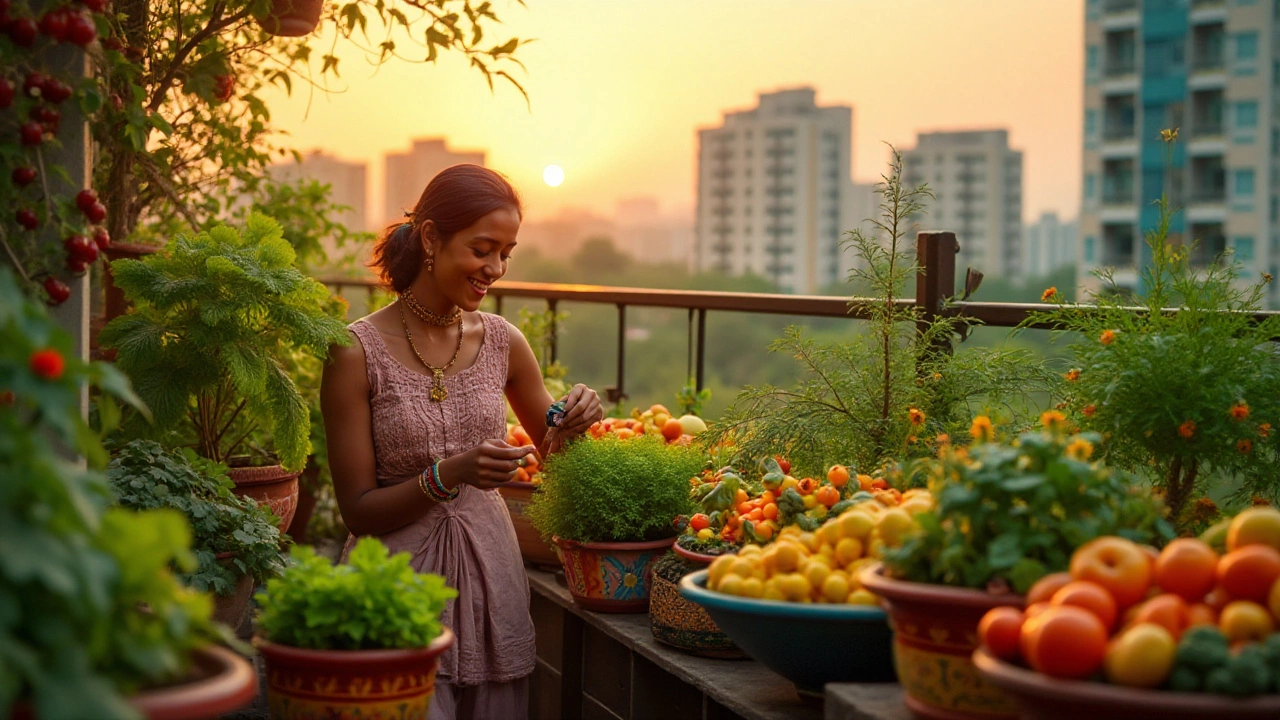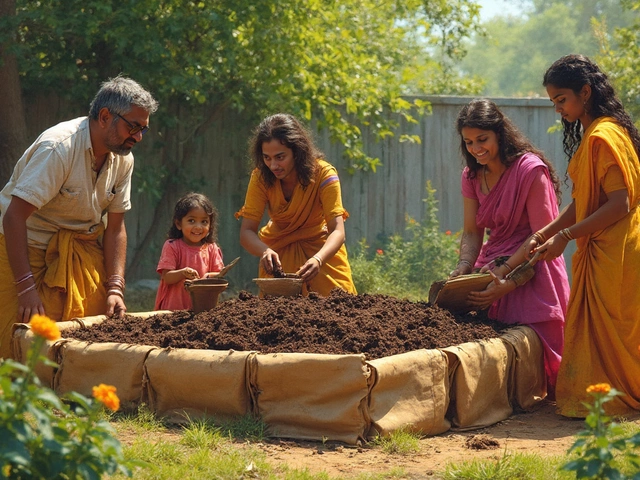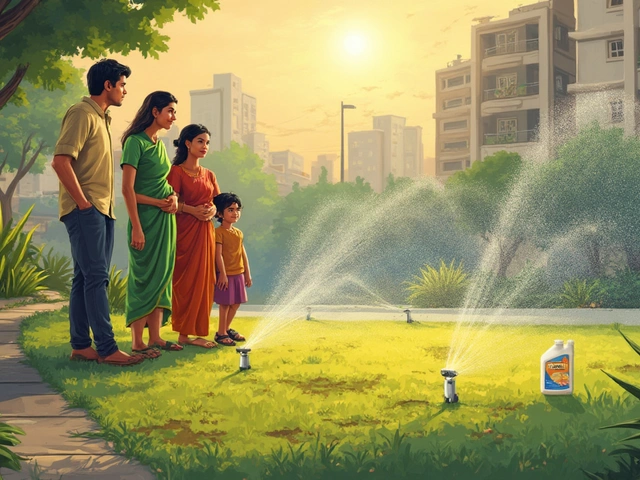Picture this: stepping out onto your balcony and plucking a ripe tomato straight from the vine, or snipping fresh basil leaves to sprinkle over your homemade pizza. Sounds dreamy, doesn't it? For many urban dwellers, growing fruits and vegetables in pots is more than just a hobby—it's a way of life. Whether you have a tiny balcony or a spacious rooftop garden, anyone can cultivate a bounty of fresh produce in the heart of the city.
From the humble strawberry to the versatile tomato, there's a range of plants that thrive in containers. You don't need a sprawling backyard; with the right choices, your balcony can be a thriving edible garden. Get ready to explore the easiest fruits and vegetables to grow in pots, alongside practical tips that will make your plants flourish. Let's dig in!
- Why Choose Potted Gardening
- Top Fruits for Container Growth
- Must-Have Vegetables for Pots
- Tips for a Bountiful Balcony Harvest
Why Choose Potted Gardening
Potted gardening offers a myriad of benefits that make it an attractive option for both urbanites and those with limited outdoor space. One of the main advantages is the versatility and flexibility it provides. Pots can be moved around easily to catch the best sunlight or to protect plants from harsh weather conditions. This mobility is especially important for city dwellers whose balconies might not always be oriented for optimal sun exposure. The ability to shuffle pots around means that you can have thriving plants regardless of your balcony's direction.
Another enticing factor is the control over plant growth conditions. In a pot, you are in charge of the quality of soil, ensuring it's packed with the nutrients needed for your plants to flourish. This control extends to managing pests and diseases, which can be more easily isolated and treated compared to traditional garden beds. The ability to tailor conditions specifically for each plant means that more delicate or exotic plants, which might struggle in a traditional garden, can thrive. Potted gardening also makes it possible to grow a diverse range of plants in a small area, mixing fruits, vegetables, and herbs that can complement each other.
Accessibility and Aesthetic Appeal
Potted gardening isn't just about practicality; it’s a feast for the eyes too. A well-arranged collection of pots can transform a dull balcony into a vibrant haven of greenery and color. Besides the visual appeal, there's something satisfying and therapeutic about tending to a garden, no matter its size. It offers a chance for urban dwellers to reconnect with nature and enjoy the simple joys of watching life sprout from the soil. Moreover, this method of gardening is accessible to almost anyone. Whether you're young or old, live in a sprawling house or a compact apartment, container gardening can fit into your lifestyle seamlessly.
"Potted gardening not only brings beauty into confined spaces but also provides a sustainable way to enjoy homegrown food." — Gardeners' Weekly
For many, potted gardening becomes a family affair. Engaging children in the process of planting and nurturing plants can spark their love for nature, providing educational opportunities that teach patience and responsibility. It's a wonderful way to introduce kids, like my own son Rohan, to the wonders of the natural world. As they watch their vegetables and fruits grow, they develop an appreciation for the environment and the effort involved in food production.
Finally, in terms of eco-friendliness, potted gardening can be a sustainable practice. Using organic soils, recycled containers, and homemade compost can reduce waste and reliance on store-bought produce. The act of growing your own food reduces the carbon footprint associated with transporting vegetables and fruits long distances. Additionally, you can't ignore the convenience of having fresh herbs and produce just a few steps away from your kitchen, ready for any meal you whip up.
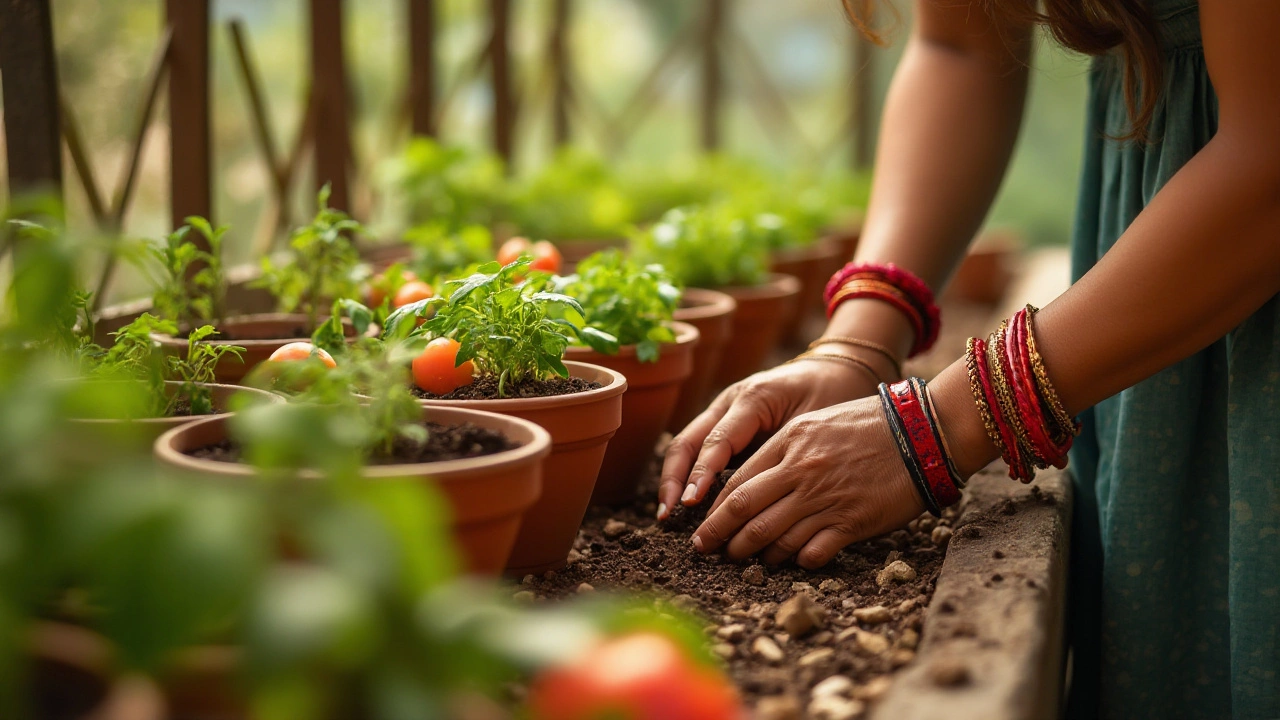
Top Fruits for Container Growth
Imagine starting your day with the delightful aroma of freshly grown fruits wafting through your balcony. For many urban gardeners, the magic begins with choosing the right fruits for potted gardening. Whether you have limited space or just want to dip your toes into the world of gardening, cultivating fruits in pots can be both rewarding and accessible. There is a perfect plant for every balcony, and you'll find your collection growing before you know it. One of the easiest fruits to kick off your container gardening journey is the strawberry. Known for their luscious sweetness, strawberries require minimal space yet yield generous rewards. Choose everbearing varieties to enjoy multiple harvests through the season. Get creative with hanging baskets or tiered planters to maximize your yield and aesthetics.
The beauty of the humble strawberry is that they are resilient, handle various climates, and need only a sunny spot and well-drained soil to thrive. Regularly water them; however, avoid waterlogged conditions. If you’re new to potted gardening, strawberries may become your go-to fruit for experiments. As the old adage from a seasoned gardener goes,
"Gardening is the art that uses flowers and plants as paint and soil and sky as canvas. Grow strawberries, and your vases will overflow with nature’s wonders, right on your balcony."Next comes the tangy delight of lemons. Dwarf lemon trees are a stellar choice, as they fit well in containers and provide both fruit and a sensory experience through their fragrant blossoms. Ensure your lemon tree gets enough sunlight, ideally 8 hours a day, to keep those citrus notes abundant. Frequent feeding with nitrogen-rich fertilizer ensures vibrant growth, and mindful watering will be rewarded with juicy lemons. It’s the fresh zing of a lemon wedge plucked from a tree you grew yourself that adds a zing to summer beverages.
Equally exciting is the addition of blueberries to your balcony garden. These berries are a powerhouse of nutrition and are perfect candidates for container growth. Keep in mind, blueberries prefer slightly acidic soil. So, mix some peat moss into your potting mix for optimal vitality. You'll need to plant at least two different varieties for cross-pollination, ensuring a bountiful harvest. Blueberries can easily adapt and become a favorite aspect of your urban landscape due to their year-round interest— from bright blooms to colorful fruits, and stunning fall foliage.
If you're looking for a more tropical atmosphere, consider growing dwarf banana plants. Not only do they provide conversation starters with their unique foliage, but under the right conditions, they can bear bananas. Ensure you have a spacious pot, as bananas do grow quickly. Optimal temperature, regular feeding, and correct humidity levels are critical points to consider. You may even find yourself sharing tips with fellow urban *potted gardening* enthusiasts. Lastly, for those seeking a vine-climbing challenge, kiwi fruit offers an exotic touch to your garden. Be patient with the growth, and ensure you have a well-supported trellis system in place. The eventual reward of homegrown kiwi fruit is worth the meticulous care involved. Choose hardy varieties suited for containers.
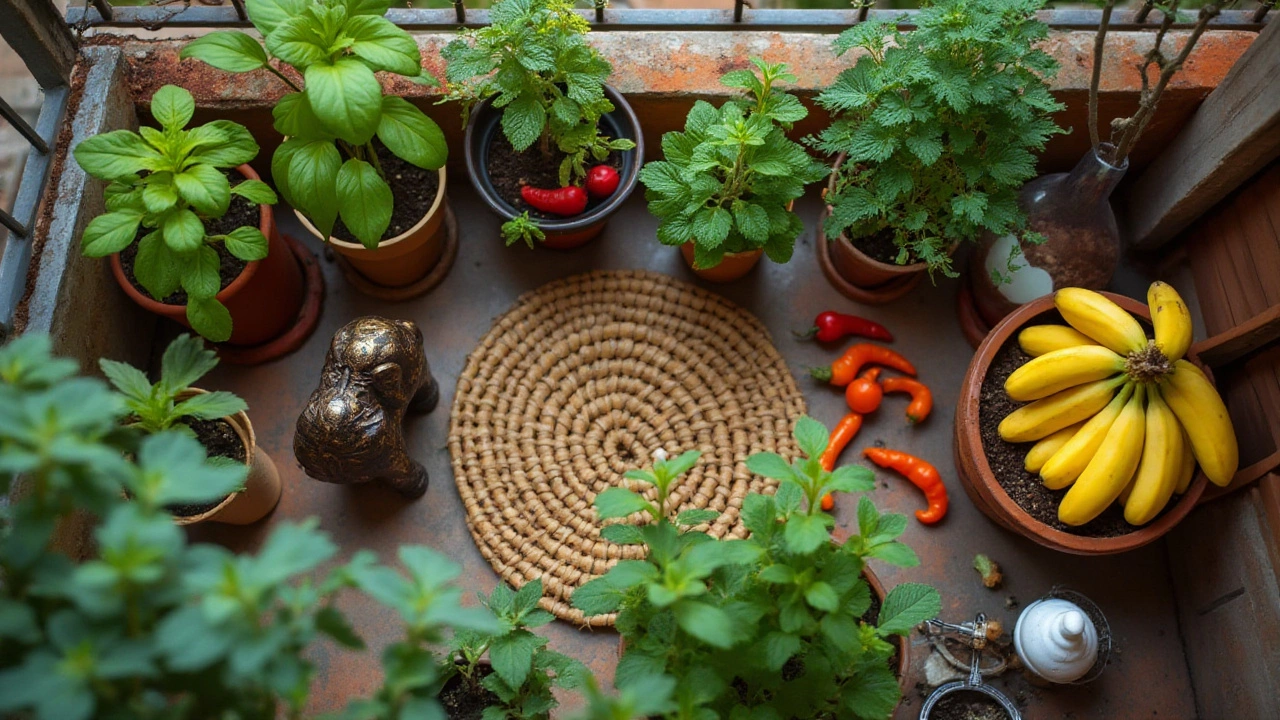
Must-Have Vegetables for Pots
When it comes to growing vegetables in pots, size doesn't always dictate the yield. Often, it's about choosing the right potted gardening candidates that can thrive in confined spaces and produce abundantly. One of the most popular vegetables for container gardening has to be the tomato. Not only do they come in various sizes and varieties, but tomatoes also flourish with ample sunlight and a steady supply of nutrients. From cherry to beefsteak, tomatoes are a staple for any balcony setup, offering vibrant colors and flavors. Consider growing a dwarf variety or hanging basket tomatoes for a beautiful cascading effect.
Another top contender is lettuce, known for its quick-growing nature and versatility. Lettuce varieties, such as romaine, iceberg, and butterhead, are perfect for urban gardening due to their compact growth habits. You can easily manage these in a shallow container, and they have fast harvest cycles, allowing for continuous planting and harvesting. A neat trick to extend their growing season is to plant them with herbs like basil and cilantro, creating a fresh and colorful display.
Peppers, too, prove excellent for pot growth, whether you prefer sweet bell peppers or fiery chili varieties. They require somewhat similar conditions as tomatoes – plenty of sunlight and warmth. An advantage of peppers is that they add visual appeal to your balcony garden with their vibrant colors. To maximize productivity, ensure your peppers have a rich soil mix and consistent moisture levels. Consider adding a stake or support for larger varieties to prevent them from toppling over.
Don't leave out carrots when planning your balcony vegetables. Though often associated with open ground, many carrot varieties adapt well to deep containers. Opt for shorter varieties like 'Paris Market' or 'Thumbelina,' which do well in container environments. Carrots thrive in cooler weather, making them an ideal early or late-season crop. A tip for growing carrots is ensuring the soil remains loose and free of obstructions that could hinder root development.
Radishes can't go unmentioned in a list of must-grow container vegetables. Not only are they quick to mature, sometimes within 30 days, but they also add a delightful crunch and spice to salads. Radishes are fantastic for teaching children about gardening due to their short growing time. Interestingly, they have the dual purpose of making great companions when planted alongside slower-growing plants, maximizing space efficiency. An added bonus is their attractive round foliage, which adds a decorative touch to a potted garden.
To round up the list, consider growing easy-to-grow plants like green beans. Both bush and pole varieties perform well in containers. Bush types are compact, making them suitable for smaller spaces, and require less support. In contrast, pole beans can be trained on trellises or poles, making vertical use of available space. They typically produce a higher yield over an extended period, allowing for multiple harvests. Ensure they receive plenty of sunlight and regular watering to keep the plants healthy.
Renowned horticulturist, Monty Don, once said, "A garden is a grand teacher. It teaches patience and careful watchfulness; it teaches industry and thrift; above all, it teaches entire trust." This holds even more true for container gardening, where adaptability and nurturing patience lead to a flourishing edible oasis in limited spaces.
Incorporating these vegetables into your balcony setup not only diversifies your garden but also enhances the joy of growing your own food. With an array of colorful and productive possibilities, your balcony can become a cherished haven for fresh produce.
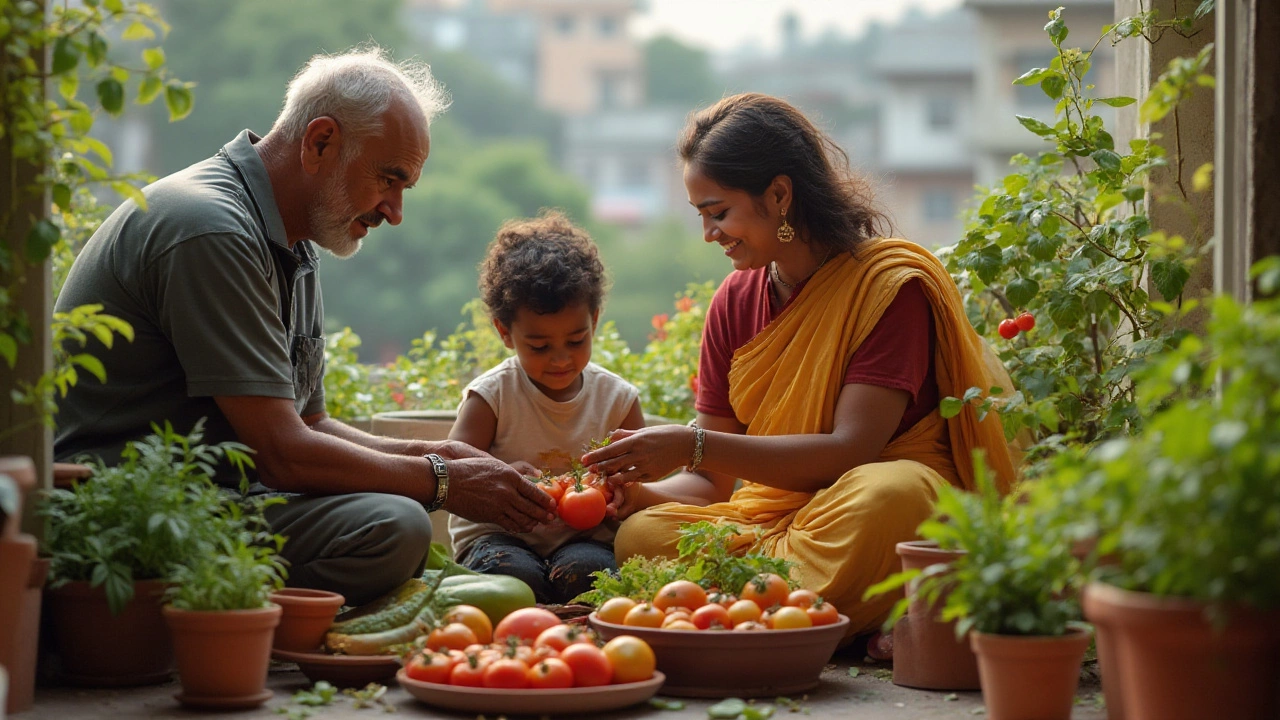
Tips for a Bountiful Balcony Harvest
Gardening in urban settings might seem challenging at first glance. Yet, with a little know-how, your balcony can transform into a lush oasis producing plenty of fruits and vegetables. The first step is choosing the right pots. Typically, you want containers that are large enough to hold growing roots. At the same time, ensure they have adequate drainage to prevent waterlogging. Choose clay or ceramic pots if possible, as they help regulate moisture, keeping your plants happy and healthy. Remember, your balcony might be more exposed to wind than a traditional garden; consider heavier pots to hold your plants steady.
Next, let's talk about the soil. Ordinary garden soil won't do the trick for your potted plants as it compacts too easily. Instead, opt for a quality potting mix that’s light and allows for proper aeration. Look for mixes that include components like peat moss, vermiculite, or perlite. These enhance drainage and hold moisture effectively, supplying your plants with nutrients over time. Fertilize with organic compost every few weeks to replenish nutrients. Urban gardening tends to drain nutrients faster due to increased watering.
Sun exposure is crucial for successful potted gardening. Most fruits and vegetables need about 6 hours of direct sunlight a day, so consider placing your pots where they'll catch ample rays. Be mindful of how shadows from buildings affect sun coverage throughout the day. In case you lack enough sunlight, consider growing shade-tolerant plants such as lettuce or spinach. Drip irrigation systems, moisture retentive soil amendments, and mulch layers are excellent allies in managing watering needs efficiently.
Feeding your plants the right nutrients is like fueling a car. Without the proper inputs, they just won’t reach their full, productive potential. Use a balanced fertilizer every two weeks, with extra feeding given to those heavy feeders like tomatoes and peppers. With time, you’ll develop a keen sense of when your plants need a little nutrition boost. Speaking of boosts, consider companion planting, which can promote growth and deter pests. For example, basil and tomatoes grow well together not just in dishes, but in the same pot, too!
"Gardening is the art that uses flowers and plants as paint, and the soil and sky as canvas." — Elizabeth Murray
Pest management is another critical aspect of maintaining a bountiful harvest. Potted plants can become more susceptible to insects and diseases due to confined spaces. Regularly inspect your plants for any signs of trouble, such as chewed leaves or discolored spots. Use natural remedies like neem oil or insecticidal soap to tackle minor infestations. Plus, encourage beneficial insects like ladybugs or lacewings to visit your balcony by planting flowers nearby. They’ll gobble up pests and invite biodiversity into your potted gardening space.
Lastly, remember that patience and observation are your best tools. Keep a garden journal to track which plants do well and which fail. Over time, this record will become your own invaluable gardening handbook, tailored to your balcony’s unique conditions. Your plants will reward dedication with delicious, homegrown produce that surpasses anything found in stores. Enjoy your urban gardening journey and savor each harvested bite!
